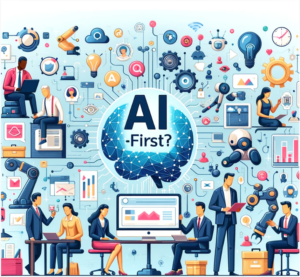
Embracing an AI-First Strategy: The Key to Unlocking Business Innovation
In the rapidly evolving digital landscape, the integration of artificial intelligence (AI) has become a game-changer for businesses seeking to stay ahead of the competition. Companies that embrace an “AI-first” approach, where AI is woven into the fabric of their operations and decision-making processes, are poised to reap the rewards of increased efficiency, enhanced customer experiences, and groundbreaking innovation. At Veritopa, we explore the steps organizations can take to successfully adopt an AI-first strategy and navigate the future of business transformation.
Understanding the AI-First Mindset
An AI-first strategy goes beyond merely utilizing AI technologies; it involves a fundamental shift in mindset. It recognizes AI as a strategic enabler that should permeate every aspect of the organization, from product development and operational processes to customer interactions and strategic planning. This mindset requires a cultural transformation that embraces data-driven decision-making, continuous learning, and an unwavering commitment to innovation.
Steps to Adopting an AI-First Strategy
- Cultivate an AI-Ready Culture: Fostering an AI-first approach begins with nurturing a culture that celebrates change, innovation, and data-driven decision-making. Organizations must educate employees at all levels about the benefits and implications of AI, encouraging an environment of continuous learning and adaptability. Valuing data as a critical asset is also essential, as AI technologies thrive on high-quality data.
- Invest in Talent and Training: Building a strong AI capability requires attracting and retaining top talent in fields such as data science, machine learning, and AI engineering. However, investing in talent goes beyond hiring; it also involves upskilling and training existing employees to develop an in-house pool of AI expertise. Providing learning opportunities and resources can equip teams with the necessary skills to develop, deploy, and maintain AI solutions effectively.
- Establish a Robust Data Infrastructure: AI systems require vast amounts of high-quality data to learn, make accurate predictions, and drive intelligent decision-making. Organizations must invest in building a robust data infrastructure that can collect, store, process, and govern data efficiently. This includes implementing data management practices that ensure data quality, accessibility, and security, while addressing privacy concerns.
- Prioritize AI in Strategic Planning: Integrating AI into strategic planning ensures that AI initiatives are aligned with the company’s overall objectives, market position, and long-term vision. Leaders should evaluate how AI can be leveraged to solve business challenges, enhance customer experiences, and create new value propositions. Strategic planning should also consider the ethical implications of AI, ensuring that AI technologies are developed and deployed responsibly.
- Foster Innovation and Collaboration: An AI-first approach thrives on innovation and collaboration. Companies should encourage experimentation, idea-sharing, and cross-functional collaboration across teams and departments. Partnering with external entities, such as universities, research institutions, and technology providers, can also provide access to new insights, technologies, and expertise, accelerating AI innovation.
- Measure and Continuously Improve: Implementing an AI-first strategy is an ongoing journey that requires regular assessment and refinement. Organizations should establish metrics to measure the impact of AI initiatives on business performance, customer satisfaction, and operational efficiency. Based on these insights, strategies, processes, and AI models can be adjusted and optimized to maximize the benefits of AI and drive continuous improvement.
Evolve your Competitive Advantage
Embracing an AI-first strategy is more than just adopting new technologies; it’s a transformative mindset that places AI at the core of business operations and strategic decision-making. By integrating AI into every aspect of their organization, companies can unlock new opportunities for growth, innovation, and competitive advantage. As the role of AI in business continues to expand, the shift towards an AI-first approach will become increasingly crucial for organizations seeking to lead the charge in their respective industries and shape the future of business innovation.